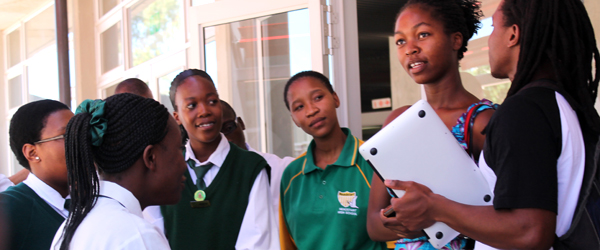Latest News Archive
Please select Category, Year, and then Month to display items
12 October 2020
|
Story Arina Engelbrecht
|
Photo Supplied
 Arina Engelbrecht from Organisational Development and Employee Well-being believes physical activity has a number of benefits for one’s health, including stress relief.
Arina Engelbrecht from Organisational Development and Employee Well-being believes physical activity has a number of benefits for one’s health, including stress relief.
Being physically active plays a big role in preventing the development of mental-health problems and in improving the quality of life of people experiencing mental-health problems.
Treatment for depression
Physical activity can be an alternative treatment for depression. It can be used as a stand-alone treatment or in combination with medication and/or psychological therapy. It promotes all kinds of changes in the brain, including neural growth, reduced inflammation, and new activity patterns are formed that promote feelings of calm and well-being. It releases endorphins – powerful chemicals in the brain that energise your spirit and make you feel good.
Physical activity can be very effective in relieving stress. Research in adults has found that physically active individuals tend to have lower stress levels compared to individuals who are less active. It also leads to improved sleep. When a person sleeps better and feels more rested, overall quality of life improves. They cope better with daily life stressors.
Reduce Alzheimer's risk
Regular physical activity can reduce your risk of developing Alzheimer's disease by up to 50%. It can also slow down further deterioration in those who have already started to develop cognitive problems. It stimulates the brain’s ability to maintain old connections as well as to make new ones.
A study asked people to rate their mood immediately after periods of physical activity (e.g. going for a walk/run, cycling, doing housework) and periods of inactivity (e.g. reading a book or watching television). Researchers found that participants felt more content, more awake, and calmer after being physically active compared to after periods of inactivity.
In conclusion, people who are physically active feel a sense of well-being, feel more energetic throughout the day, sleep better at night, have sharper memories, and feel more relaxed and positive about themselves and their lives.
“Being physically active not only changes your body, it changes your mind,
attitude, and your mood.” – Arina Engelbrecht
Kovsie Debate team compete against high school learners in debate on volunteerism
2013-02-13
 |
Learners from Headstart High School with Kovsie students.
Photo: Linda Fekisi |
Grade 12 learners from Headstart High School took on a team from the university in a debate on the Bloemfontein Campus. The school, in partnership with the University through the Schools Partnership Programme, will be visiting various divisions within the institution in the next four years.
The topic of the debate, Volunteerism and Social Citizenship, was brought forward by the Volunteers Office which is part of Kovsie student life. “The aim was to share our knowledge on volunteerism with the learners and at the same time encourage them to do their own research on the topic. We are making use of experimental learning to make them used to the whole notion of volunteerism”, said the Assistant Dean for Student Affairs, Pura Mgolombane.
The learners, who receive English lessons by Prof Jonathan Jansen, Vice-Chancellor and Rector, engaged in the conversation with ease as they expressed their own views on the subject matter. Their debate was moderated by the Chairperson of the Debate Society, Zola Valashiya.